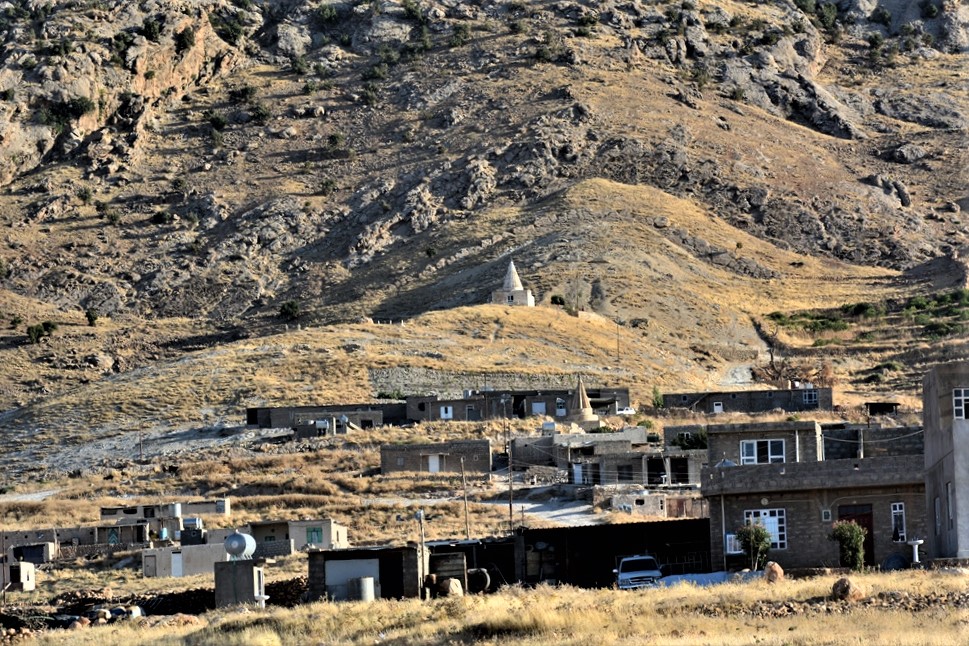After 44 years of displacement and forcible resettlement Thousands of Ezidis plan to return to their villages located on Mount Shingal (Sinjar).
In 1975, the former Ba’ath regime in Iraq ordered the confiscation of property, the destruction of the mostly Ezidi villages and resettled them in residential compounds on the outskirts of Shingal.
Khalaf Hamad, a 75-year-old Ezidi man, has been living away from his home village on Mount Shingal for decades. He appeals to authorities to rehabilitate the villages and enable their indigenous residents to return home.
Recalling what he went through almost 44 years ago, Khalaf said, "In the fall of that year, Iraqi government forces stormed our village and gave us a 24-hour ultimatum to leave.”
Eventually, Khalaf Hamad was among thousands others who chose to leave their homes on Mount Shingal towards the areas designated for them.
"Our houses were demolished and our farms were burne; therefore, it was impossible for us to go back."
After giving up on returning home, Khalaf decided to build a house for his family where he was relocated.
A farmer using old ploughing technique on his farm in Mount Shingal’s Kolka village with the help of cattle Photo: KirkukNow
Even after the former Ba’ath regime was toppled, Mount Shingal villagers were displaced once again; this time when Shingal was overran by Islamic State (IS) fighters in August 2014.
It has been four years since Shingal was retaken from the grip of IS, yet the massive damage left behind, the return of Khalaf and the thousands of Ezidis who were forcibly driven out from their villages seems to be even more difficult.
Jalal Khalaf, Tal Ozer sub-district commissioner and one of those who were forced out of their villages in Mount Shingal, speaking to KirkukNow, said, “In 1975, Almost the entire Ezidi population of Shingal lived in Mount Shingal. The mountain was of great importance to Ezidis; it represented a castle for them and gave them a high level of independence."
“"In that year, the inhabitants of 155 Ezidi villages were forcibly displaced into 11 residential compounds built north and south of Shingal after authorities accused them of backing the Kurdish Peshmarga forces.”
According to Khalaf, “from that year on, Ezidis were banned from entering the Mount Shingal area; whoever was spotted there faced the risk of being arrested.”

Wasfa village on Mount Shingal is home to several religious sites Photo: KirkukNow
Mount Shingal is a 100-kilometre-long mountain range that runs east to west, rising above the surrounding alluvial steppe plains in northwestern Iraq to an elevation of 1,463 meters. The highest segment of these mountains, about 75 km long, lies in the Ninewa province. The western and lower segment of these mountains lies in Syria and is about 25 km long.
The city of Sinjar is just south of the range.[3][4] These mountains are regarded as sacred by the Yazidis
Mount Shingal is home to a number of archaeological and religious sites. The area became a safe haven for thousands of Ezidis fleeing IS brutality in 2014.
Ezidin Alo, who has been living in Nser village north of the Shingal Mountains, says he feels safe there. “I have 300 head of sheep and goats which I raise here without fear. I did not leave my village when IS attacked Shingal," he told KirkukNow.
As for now, the Ezidi families who fled for safety on Mount Shingal seek to return to their homes in the center of Shingal; while those who were forcibly displaced from their villages on Mount Shingal 44 years ago seek another homecoming.
Qahtan Ali, head of Shingal municipality says since 2014 many families have settled on Mount Shingal. We are working to provide returnees with basic services, particularly drinking water.”
“The area is already facing water shortages, and the return of more families might worsen the problem,” he said.
The construction of roads to reconnect Mount Shingal villages is according to Qahtan Ali, included in the municipality’s plans to restore life back to the area.




